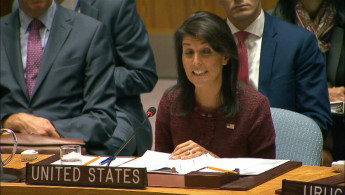UN sets up probe of IS atrocities in Iraq
Under the measure, UN Secretary-General Antonio Guterres will within 60 days present to the council details on the mandate of the investigative panel that will work with their Iraqi counterparts.
The investigators will gather evidence on "war crimes, crimes against humanity or genocide" for use in Iraqi courts, according to the resolution.
Britain presented the resolution to help bring perpetrators of IS war crimes to justice - a cause championed by international human rights lawyer Amal Clooney.
After months of pressure, Iraq in August agreed to the investigation which will "support domestic efforts to hold" IS militants accountable by "collecting, preserving and storing evidence" in Iraq, the resolution said.
The United Nations has described the massacres of the Yazidis as genocide and Clooney has made two high-profile appearances before the world body to demand action.
The Lebanese-British lawyer represents Yazidi women who were taken hostage and used as sex slaves by IS as it swept into Iraq's Sinjar region in August 2014.
"Why is it that nothing has been done?" Clooney told a UN event in March.
"Mass graves lie unprotected and unexhumed. Witnesses are fleeing and not one ISIS militant has faced trial for international crimes anywhere in the world," she said, using an alternative acronym for the militant group.
IS fighters have been on the run in Iraq since the recapture of Mosul, Iraq's second city in July, which had been under IS rule since 2014.
Tens of thousands of Yazidis fled the August 2014 massacre in Sinjar, and UN rights investigations have documented horrific accounts of abuse suffered by women and girls.
Around 3,000 women are believed to remain in IS captivity.





 Follow the Middle East's top stories in English at The New Arab on Google News
Follow the Middle East's top stories in English at The New Arab on Google News


